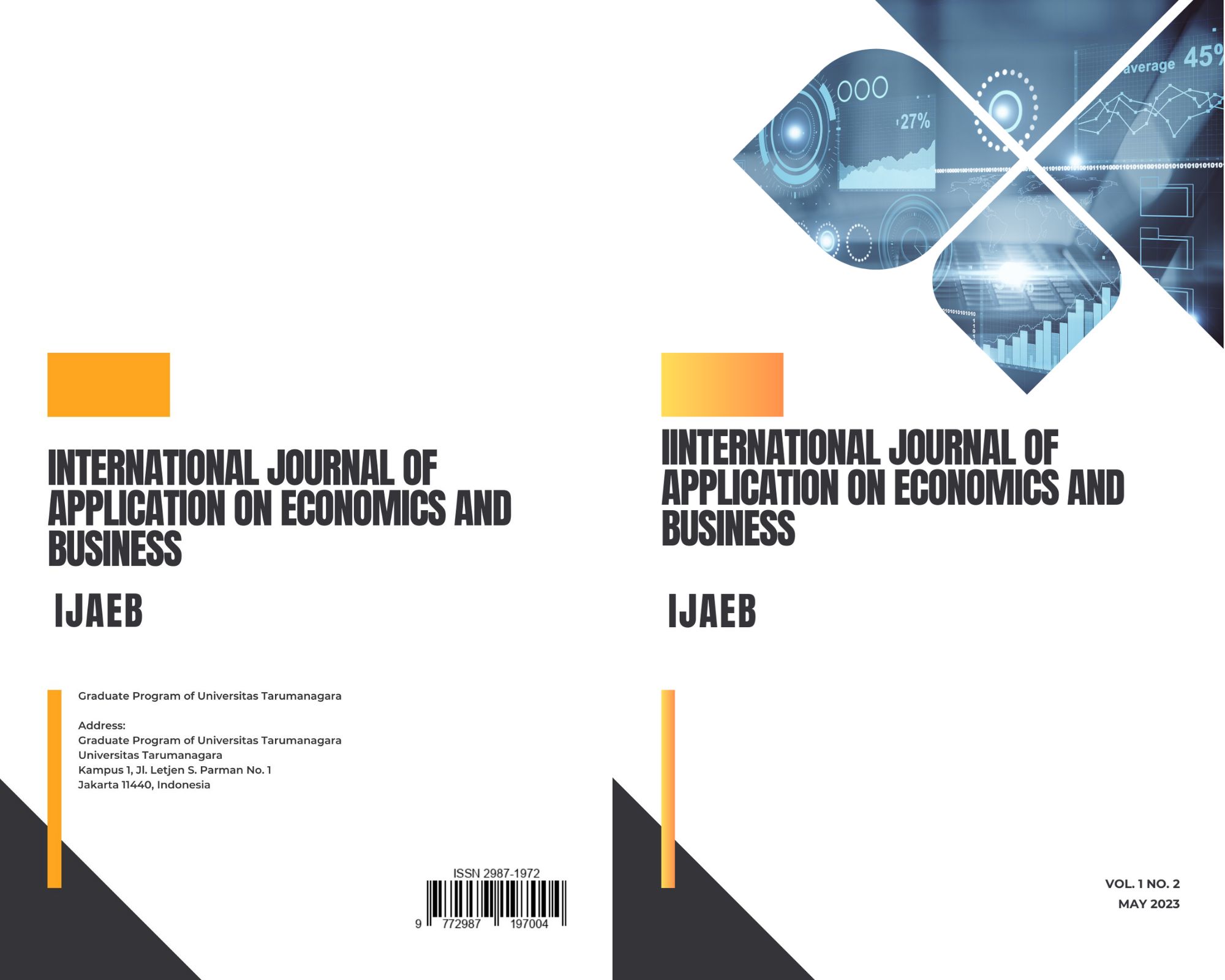THE EFFECT OF TAX PLANNING ON TAX AVOIDANCE WITH TAX AGGRESSIVENESS AS A MODERATOR IN THE PERIOD BEFORE AND AFTER THE TAX AMNESTY
Main Article Content
Abstract
The research aims to discover the effect between tax planning, such as permanent difference, temporary difference, and foreign tax-rates differentials moderated by tax aggressiveness on tax avoidance before and after the tax amnesty period. This research obtained from 120 initial samples of companies listed in IDX for 2013-2019 period with purposive sampling method. The result shows that only one research model of permanent difference and tax aggressiveness had a significant negative effect on tax avoidance; some models of temporary difference and tax aggressiveness had a significant positive effect on tax avoidance; three research models of foreign tax-rates differentials had none significant effects on tax avoidance; and only on two models of permanent difference that had not been able moderated by tax aggressiveness towards tax avoidance. Hopefully this research could give advantages on implementing tax planning as an important strategy to consistently provides good signals to the company’s external parties.
Article Details
Section

This work is licensed under a Creative Commons Attribution-NonCommercial-ShareAlike 4.0 International License.
This journal provides immediate open access to its content on the principle that making research freely available to the public supports a greater global exchange of knowledge.
IJAEB by Graduate Program of Universitas Tarumanagara is licensed under a Creative Commons Attribution-NonCommercial-ShareAlike 4.0 International License.. Permissions beyond the scope of this license may be available at https://journal.untar.ac.id/index.php/ijaeb
References
Kementerian Keuangan Republik Indonesia, Menkeu: Pajak Merupakan Tulang Punggung Nasional, 2020, available at: https://www.kemenkeu.go.id/publikasi/berita/ menkeu-pajak-merupakan-tulang-punggung-nasional/
L. Susanto, Yanti, Viriany, Faktor-Faktor Yang Mempengaruhi Agresivitas Pajak, Jurnal Ekonomi, 23(1), 2018, pp. 10–19. DOI: http://dx.doi.org/10.24912/je.v23i1.330
Komisi XI Dewan Perwakilan Rakyat Republik Indonesia, Pendapatan Negara Didominasi Perpajakan, 2019, available at: https://www.dpr.go.id/berita/detail/id/ 24532/t/
Ngadiman, C. Puspitasari, Pengaruh Leverage, Kepemilikan Institusional, dan Ukuran Perusahaan terhadap Penghindaran Pajak (Tax avoidance) pada Perusahaan Sektor Manufaktur yang Terdaftar di Bursa Efek Indonesia 2010-2012, Jurnal Akuntansi, 8(3), 2014, pp. 408–421. DOI: http://dx.doi.org/10.24912/ja.v18i3.273
I. Brian, D. Martani, Analisis Pengaruh Penghindaran Pajak dan Kepemilikan Keluarga terhadap Waktu Pengumuman Laporan Keuangan Tahunan Perusahaan, Jurnal Keuangan dan Perbankan (Finance and Banking Journal), 16 (2), 2014, pp. 125-139. http://jurnal. perbanas.id/index.php/JKP/article/view/16
Kompas, Menghindari Persepsi Pengampunan Pajak Permanen di Masyarakat, 2017, available at: https://ekonomi.kompas.com/read/2017/11/27/114700326/menghindari-persepsi-pengampunan-pajak-permanen-di-masyarakat?page=all
Kompas, Tapal Kuda dan Tambang, 2015, available at: http://www.apbiicma.org/uploads/ files/old/2015/11/Tapal-Kuda-dan-Tambang.jpg
R. Antonius, L.D.R. Tampubolon, Analisis penghindaran pajak, beban pajak tangguhan, dan koneksi politik terhadap manajemen laba, Jurnal Akuntansi, Keuangan, dan Manajemen, 1 (1), 2019, pp. 39–52. DOI: https://doi.org/10.35912/jakman.v1i1.5
R. Murray, K.J. Prosser, Tax Avoidance, London, Sweet & Maxuel, 2012.
Kompas, Ikea Dituduh Hindari Pajak hingga Rp 14.900 Triliun, 2016, available at: https://properti.kompas.com/read/2016/02/16/081748621/Ikea.Dituduh.Hindari.Pajak.hingga.Rp.14.900.Triliun.
International Consortium of Investifative Journalist, A New ICIJ Investigation Exposes A Rogue Offshore Industry, 2016, available at: https://www.icij.org/investigations/ panama-papers/new-icij-investigation-exposes-rogue-offshore-industry/
CNN Indonesia, Panama Papers dan Praktik Penghindaran Pajak, 2016, available at: https://www.cnnindonesia.com/ekonomi/20160412112445-79-123307/panama-papers-dan-praktik-penghindaran-pajak
M. Spence, Job Market Signalling, The Quarterly Journal of Economics, 87(3), 1973, pp. 355–374. DOI: https://doi.org/10.2307/1882010
R.L. Watts, J.L. Zimmerman, Positive Accounting Theory, New Jersey: Prentice-Hall, 1986.
R.L. Watts, J.L. Zimmerman, Positive Accounting Theory: A Ten-Year Perspective, The Accounting Review, 65(1), 1990, pp. 131–156. DOI: http://www.jstor.org/stable/247880
R.L. Watts, J.L. Zimmerman, Positive Accounting Theory and Science, Journal of CENTRUM Cathedra, 3(2), 2011, pp. 136–149. DOI: http://dx.doi.org/10.2139/ssrn. 1027382
M. Nadhifah, A. Arif, Transfer Pricing, Thin Capitalization, Financial Distress, Earning Management, dan Capital Intensity terhadap Tax avoidance dimoderasi Oleh Sales Growth, Jurnal Magister Akuntansi Trisakti, 7(2), 2020, pp. 145–170. DOI: http://dx.doi. org/10.25105/jmat.v7i2.7731
C.A. Pohan, Manajemen Perpajakan, Jakarta, Gramedia Pustaka Utama, 2016.
B.W. Goh, L. Lee, C.Y. Lim, T. Shevlin, The Effect of Corporate Tax Avoidance on the Cost of Equity, The Accounting Review, 91(6), 2016, pp. 1647–1670. DOI: https://doi. org/10.2308/accr-51432
Republik Indonesia, Surat Edaran Direktur Jenderal Pajak Nomor SE-02/PJ/2016 tentang Pembuatan Benchmark Behavioral Model dan Tindak Lanjutnya, Jakarta, 2016.
R. Apriliyan, E. Trisnawati, H. Budiono, Tax-Saving Components on Tax Disclosures. Advances in Economics, Business and Management Research, vol. 174, 2021, pp. 271–271. DOI: https://dx.doi.org/10.2991/aebmr.k.210507.041
M.H. Mgammal, The effect of components of tax saving on tax disclosure: A panel data approach in Malaysian listed companies, Pacific Accounting Review, 31(4), 2019, pp. 574–601. DOI: https://doi.org/10.1108/PAR-10-2018-0080
M.H. Mgammal, Corporate tax planning and corporate tax disclosure, Meditari Accountancy Research, 28(2), 2020, pp. 327–364. DOI: https://doi.org/10.1108/MEDAR -11-2018-0390
N.S.A. Wahab, Tax planning and Corporate Governance: Effects on Shareholders Valuation, Thesis for the degree of Doctor of Philosophy, University of Southampton, Southampton UK, 2010, http://eprints.soton.ac.uk/162801/
M.M. Frank, L.J. Lynch, S.O. Rego, Tax Reporting Aggressiveness and Its Relation to Aggressive Financial Reporting, The Accounting Review, 84(2), 2009, pp. 467–496. DOI: https://doi.org/10.2308/accr.2009.84.2.467
E. Trisnawati, Fenny, H. Budiono, Influence of Transfer Pricing, CEO Compensation, and Accounting Irregularities on Tax Aggressiveness, Advances in Social Science, Education and Humanities Research, vol. 439, 2020, pp. 170–174. DOI: https://dx.doi. org/10.2991/aebmr.k.210507.041
E. Trisnawati, E. Sugiarto Dermawan, M.F.D. Indrajati, The Effect of Accounting Irregularities Toward Tax Aggressiveness Before and After the Tax Amnesty, Advances in Economics, Business and Management Research, vol. 174, 2021, pp. 30–37. DOI: https://dx.doi.org/10.2991/aebmr.k.210507.005
E. Trisnawati, H. Budiono, The Effect of Intellectual Capital on Tax Avoidance Before and After the Tax Amnesty, Advances in Economics, Business Management Research, vol. 145, 2020, pp. 190–194. DOI: https://dx.doi.org/10.2991/aebmr.k.210507.041

